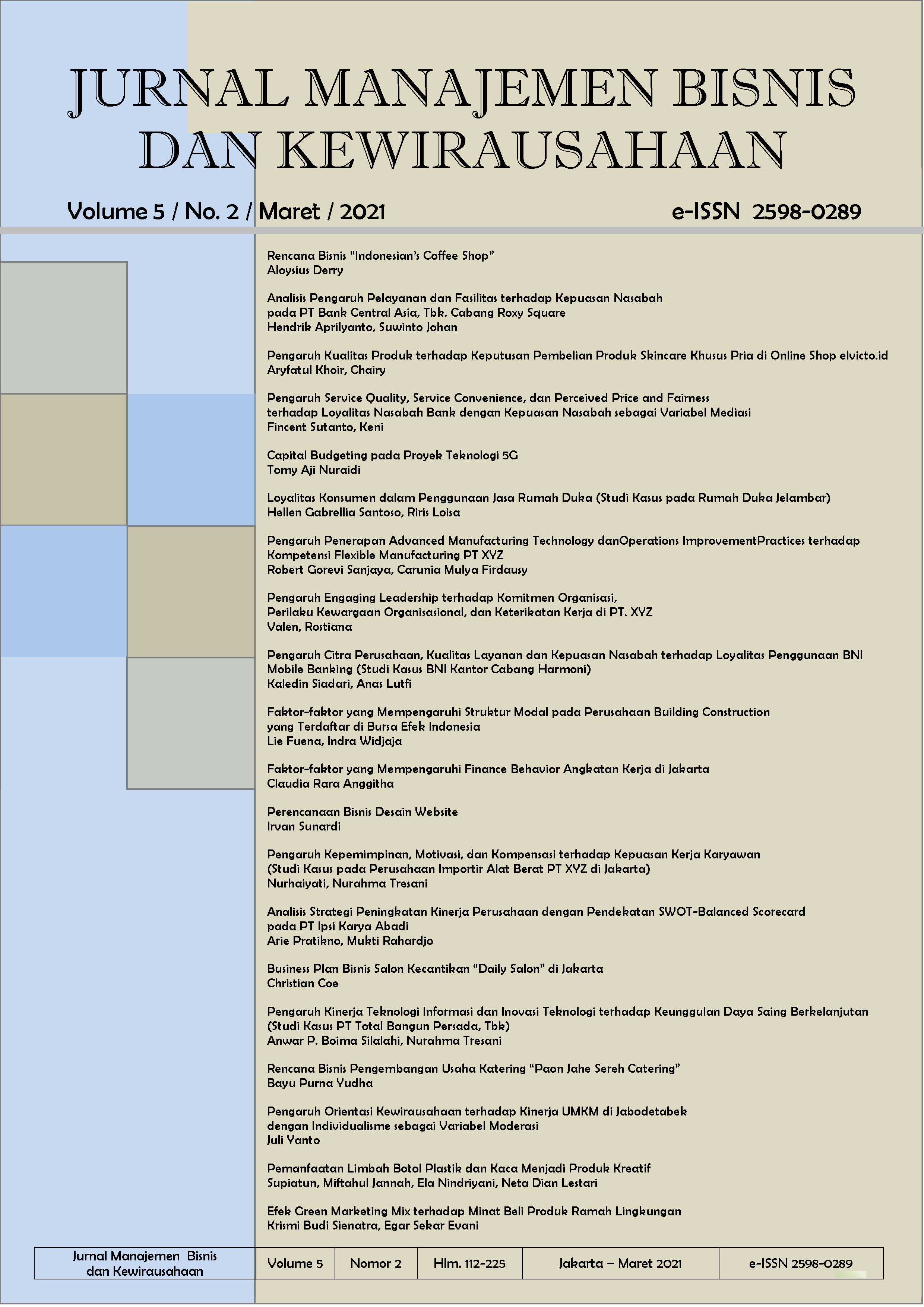Pengaruh Orientasi Kewirausahaan terhadap Kinerja UMKM di Jabodetabek dengan Individualisme sebagai Variabel Moderasi
Main Article Content
Abstract
The purpose of this study is to examine the effects of Entrepreneurship Orientation conducted by SMEs on firm performance, and exploring new concepts regarding Executive’s Individualism to moderate Entrepreneurial Orientation on SMEs performance. The sample was selected using a non-probability sampling method. The total sample chosen was 259 SMEs in the Greater Jakarta area. The method of analysis used was PLS-SEM. The results of this study indicate that 1) Entrepreneurial Orientation has a positive effect on the performance of SMEs companies in the Greater Jakarta area 2) Executive’s Individualism strengthens the relationship between Entrepreneurship Orientation with SMEs Firm Performance in the Greater Jakarta area, specifically financial performance - profit.
Tujuan dari penelitian ini adalah untuk menguji pengaruh Orientasi Kewirausahaan yang dilakukan oleh UMKM terhadap kinerja perusahaan, dan mengeksplorasi konsep-konsep baru tentang Individualisme Eksekutif dalam memoderasi Orientasi Kewirausahaan terhadap kinerja UMKM. Sampel dipilih menggunakan metode sampling non-probabilitas. Total sampel yang dipilih adalah 259 UMKM di wilayah Jabodetabek. Metode analisis yang digunakan adalah PLS-SEM. Hasil penelitian ini menunjukkan bahwa 1) Orientasi Kewirausahaan memiliki efek positif pada kinerja UMKM di wilayah Jabodetabek 2) Eksekutif Individualisme memperkuat hubungan antara Orientasi Kewirausahaan dengan Kinerja UMKM di wilayah Jabodetabek, khususnya kinerja keuangan - profit.
Article Details
This work is licensed under a Jurnal Manajemen Bisnis dan Kewirausahaan Creative Commons Attribution-ShareAlike 4.0 International License.
References
Aladejebi, O. A., Great, T., & Clinic, B. (2018). Predictors of firm performance among selected SMEs in Lagos , Nigeria Predictors of firm performance among selected SMEs in Lagos, Nigeria. International Journal of Applied Research, 4(June), 8–17.
Anlesinya, A., Eshun, P., & Bonuedi, A. A. (2015). Entrepreneurial Orientation Dimensions and Profitability Nexus: Evidence From Micro Enterprises in the Retail Sector in. International Journal of Small Business and Entrepreneurship Research, 3(7), 79–87.
Arnould, E. J., & Thompson, C. J. (2005). Consumer Culture Theory (CCT): Twenty Years of Research. The University of Chicago Press and Journal of Consumer Research, 4(1), 44. https://doi.org/10.1016/s0098-7913(78)80071-9
Barney, J. (1991). Firm Resources and Sustained Competitive Advantage. Journal of Management, 17(1), 99–120.
BPS. (2016). Analisis Hasil SE2016 Lanjutan Potensi Peningkatan Kinerja Usaha Miko Kecil.
Cho, Y. H., & Lee, J.-H. (2018). Entrepreneurial orientation, entrepreneurial education and performance. Asia Pacific Journal of Innovation and Entrepreneurship, 12(2), 124–134. https://doi.org/10.1108/apjie-05-2018-0028
Cozma, I. (2011). How are individualism and collectivism measured? Romanian Journal of Applied Psychology, 13(1), 11–17.
Dess, G. G., & Lumpkin, G. T. (2005). The Role of Entrepreneurial Orientation in Stimulating Effective Corporate Entrepreneurship. Academy of Management Executive, 19(1), 45–46. https://doi.org/10.1177/002248718203300610
Gautam, P. R. (2016). Handicraft Industry : a Study of Nepalese Handicraft. International Journal of Small Business and Entrepreneurship Research, 4(2), 48–63.
Gil, A., Brouthers, L. E., & Keig, D. L. (2019). Top management team diversity, individualism–collectivism, and MNE performance. International Journal of Cross Cultural Management, 19(3), 273–290. https://doi.org/10.1177/1470595819870819
Hair, J. F., Sarstedt, M., Hopkins, L., & Kuppelwieser, V. G. (2014). Partial least squares structural equation modeling (PLS-SEM): An emerging tool in business research. European Business Review, 26(2), 106–121. https://doi.org/10.1108/EBR-10-2013-0128
Herath, H. M. T. S., & Karunaratne, H. D. (2017). Entrepreneurial Orientation of Information and Communication Technology Services Exports in Sri Lanka. Journal of Business and Economics, 8(7), 573–583. https://doi.org/10.15341/jbe(2155-7950)/07.08.2017/006
Herlinawati, E., Suryana, Ahman, E., & Machmud, A. (2019). Pengaruh Orientasi Wirausaha terhadap Kinerja Bisnis UKM di Indonesia. Jurnal Pendidikan Kewirausahaan, 22(5), 1–9.
Hofstede, G. (2011). Dimensionalizing Cultures: The Hofstede Model in Context. Online Readings in Psychology and Culture, 2(1), 1–26. https://doi.org/10.9707/2307-0919.1014
Hutahayan, B. (2019). Factors affecting the performance of Indonesian special food SMEs in entrepreneurial orientation in East Java. Asia Pacific Journal of Innovation and Entrepreneurship, 13(2), 231–246. https://doi.org/10.1108/apjie-09-2018-0053
Jalali, A., Jaafar, M., & Thurasamy, R. (2013). Influence of entrepreneurial orientation on the financial performance: evidence from SMEs in Iran. Middle East J. of Management, 1(2), 168. https://doi.org/10.1504/mejm.2013.057263
Kim, H.-J., & Kim, B.-K. (2016). An entrepreneurial paradox: the moderating effect of the external environment. Asian Journal of Technology Innovation, 24(2), 222–233. https://doi.org/10.1080/19761597.2016.1207414
Lee, S. M., & Lim, S. (2009). Entrepreneurial orientation and the performance of service business. Service Business, 3(1), 1–13. https://doi.org/10.1007/s11628-008-0051-5
Lumpkin, G. T., & Dess, G. G. (1996). Clarifying The Entrepreneural Orientation Construct and Linking it to Performance. Academy of Management Review, 21(1), 135–172. https://doi.org/10.2307/258632
Magaji, M. S., Baba, R., & Entebang, H. (2017). Entrepreneurial Orientation and Financial Performance of Nigerian SMES: The Moderating Role of Environment. A Review of Literature. Journal of Management and Training for Industries, 4(1), 25–41. https://doi.org/10.12792/jmti.4.1.25
Matthias, E. E., Agwu, A.-N. E., & Onyeizugbe, C. U. (2016). Entrepreneurial Orientation and Performance of Small and Medium Scale Enterprises in Ebonyi State. International Journal in Management and Social Science, 04(05), 300–312.
Miller, D. (1983). The Correlates of Entrepreneurship in Three Types of Firms. Management Science, 29(7), 770–791. https://doi.org/10.1287/mnsc.29.7.770
Omisakin, O. M., Nakhid, C., Littrell, R., & Verbitsky, J. (2016). Entrepreneurial Orientation among Migrants and Small and Medium Enterprises. Journal of Business Administration Research, 5(1), 7–22. https://doi.org/10.5430/jbar.v5n1p7
Sarwono, H. A. (2015). Profil Bisnis Usaha Mikro, Kecil Dan Menengah (Umkm). Bank Indonesia Dan LPPI, 1–135.
Soares, M. do C., & Perin, M. G. (2019). Entrepreneurial orientation and firm performance: an updated meta-analysis. RAUSP Management Journal, 55(2), 143–159. https://doi.org/10.1108/RAUSP-01-2019-0014
Tambunan, T. (2008). SME development, economic growth, and government intervention in a developing country: The Indonesian story. Journal of International Entrepreneurship, 6(4), 147–167. https://doi.org/10.1007/s10843-008-0025-7
Wu, D., & Zhao, F. (2009). Measuring Performance in Small and Medium Enterprises in the Information & Communication Technology Industries (Issue February).
Yucel, I. (2011). Entrepreneurial orientation, executives individualism and Firm Performance: The moderating role of executives individualism. Far East Journal of Psychology and Business, 5(3), 63–78. http://www.fareastjournals.com/files/FEJPBV5N3P3.pdf


